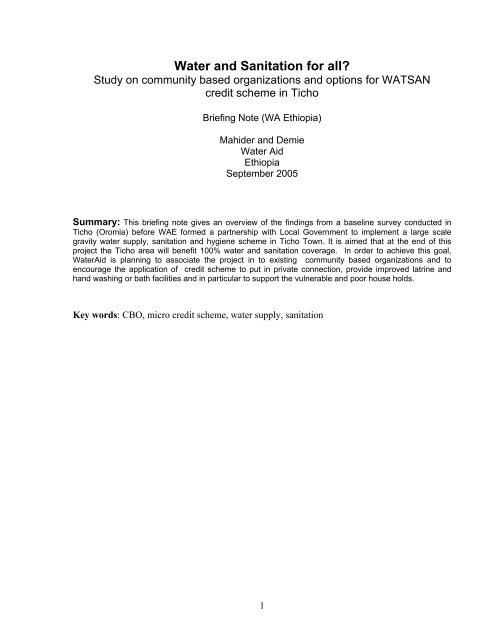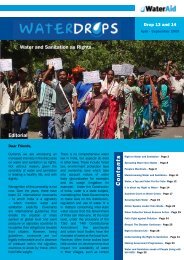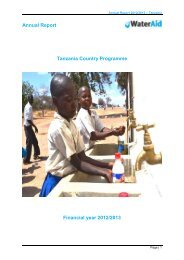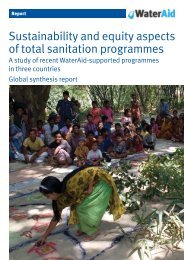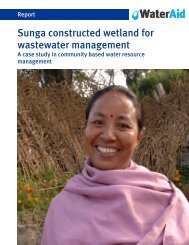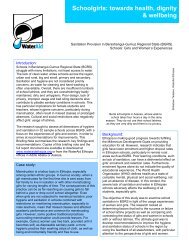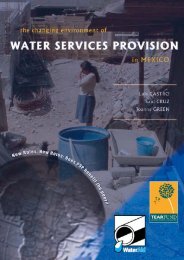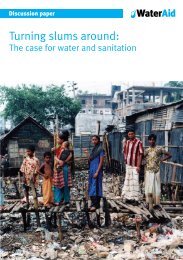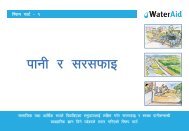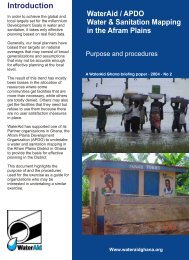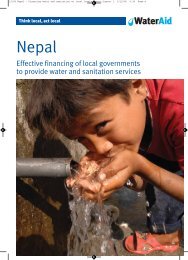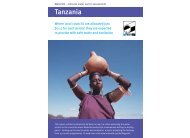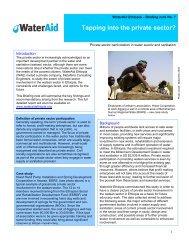Community-based organisations and options for WATSAN - WaterAid
Community-based organisations and options for WATSAN - WaterAid
Community-based organisations and options for WATSAN - WaterAid
You also want an ePaper? Increase the reach of your titles
YUMPU automatically turns print PDFs into web optimized ePapers that Google loves.
Water <strong>and</strong> Sanitation <strong>for</strong> all<br />
Study on community <strong>based</strong> organizations <strong>and</strong> <strong>options</strong> <strong>for</strong> <strong>WATSAN</strong><br />
credit scheme in Ticho<br />
Briefing Note (WA Ethiopia)<br />
Mahider <strong>and</strong> Demie<br />
Water Aid<br />
Ethiopia<br />
September 2005<br />
Summary: This briefing note gives an overview of the findings from a baseline survey conducted in<br />
Ticho (Oromia) be<strong>for</strong>e WAE <strong>for</strong>med a partnership with Local Government to implement a large scale<br />
gravity water supply, sanitation <strong>and</strong> hygiene scheme in Ticho Town. It is aimed that at the end of this<br />
project the Ticho area will benefit 100% water <strong>and</strong> sanitation coverage. In order to achieve this goal,<br />
<strong>WaterAid</strong> is planning to associate the project in to existing community <strong>based</strong> organizations <strong>and</strong> to<br />
encourage the application of credit scheme to put in private connection, provide improved latrine <strong>and</strong><br />
h<strong>and</strong> washing or bath facilities <strong>and</strong> in particular to support the vulnerable <strong>and</strong> poor house holds.<br />
Key words: CBO, micro credit scheme, water supply, sanitation<br />
1
<strong>WaterAid</strong> (Ethiopia)-briefing note-<br />
Water <strong>and</strong> sanitation <strong>for</strong> all<br />
Study on community <strong>based</strong> organizations <strong>and</strong> <strong>options</strong> <strong>for</strong> <strong>WATSAN</strong><br />
credit scheme in Ticho<br />
Introduction<br />
Ticho water supply, sanitation <strong>and</strong> hygiene promotion<br />
(WSSHPP) project is located in the Oromia National<br />
Regional State 249 km away from the capital city. Just<br />
like many rural parts of the nation the community has<br />
no potable water <strong>and</strong> the latrine coverage is almost<br />
none.<br />
The objective of this project is to improve this situation<br />
by supplying potable water through gravity scheme <strong>and</strong><br />
promoting <strong>and</strong> introducing different latrine <strong>options</strong>. It is<br />
aimed that at the end of this project the Ticho area will<br />
benefit 100% water <strong>and</strong> sanitation coverage. In order<br />
to achieve this goal, <strong>WaterAid</strong> is planning to associate<br />
the project in to existing community <strong>based</strong><br />
organizations <strong>and</strong> to encourage the application of<br />
credit scheme to put in private connection, provide<br />
improved latrine <strong>and</strong> h<strong>and</strong> washing or bath facilities<br />
<strong>and</strong> in particular to support the vulnerable <strong>and</strong> poor<br />
house holds.<br />
The community accesses water <strong>for</strong>m rivers <strong>and</strong><br />
unprotected springs. Welkessa River is the main water<br />
source of the community<br />
Photo: <strong>WaterAid</strong>/Mahider Tesfu<br />
This study assesses the different <strong>for</strong>ms of community<br />
<strong>based</strong> organizations <strong>and</strong> possible <strong>options</strong> of micro<br />
credit scheme to <strong>WATSAN</strong> provision <strong>for</strong> the intended<br />
beneficiary community.<br />
Different <strong>for</strong>ms of CBOs in Ticho<br />
Faith <strong>based</strong><br />
Background<br />
In Ticho, there is no potable water <strong>and</strong> inadequate<br />
larine coverage. The main source of water of the<br />
community is from rivers <strong>and</strong> springs. Almost all house<br />
holds in the town practice open defecation. According<br />
to the in<strong>for</strong>mation gathered from the Woreda Health<br />
Office there are a total of 100 traditional pit latrines in<br />
the town including those in the governmental offices<br />
<strong>and</strong> in some rich <strong>and</strong> average households.<br />
Iddir<br />
CBOs<br />
Local gov’t<br />
affiliated<br />
Iqub<br />
So the main objective of this study is to explore<br />
possible ways of making the general Ticho <strong>WATSAN</strong><br />
provision successful. In line with this main objective the<br />
study tried to analyze the different <strong>for</strong>ms of CBOs <strong>and</strong><br />
ways in which they would be involved in supporting<br />
peole to put in private connection, provide improved<br />
latrines <strong>and</strong> h<strong>and</strong> washing or bathing facilities <strong>and</strong><br />
particularly support to vulnerable <strong>and</strong> poor households.<br />
The study also aims to recommend <strong>options</strong> regarding<br />
the use of credit with in <strong>WATSAN</strong>.<br />
2
Photo : <strong>WaterAid</strong>/Mahider Tesfu<br />
Methodology<br />
Five percent of the total population were interviewed. In<br />
order to accommodate or represent the view of the<br />
whole community, the respondents were classified into<br />
five groups mainly <strong>based</strong> on their economic status as<br />
rich, middle wealthy, poor, destitute <strong>and</strong> female heads.<br />
Respondents were from different educational <strong>and</strong><br />
occupational status.<br />
The study team consisted of one external consultant,<br />
one research officer from <strong>WaterAid</strong> Ethiopia <strong>and</strong> a<br />
volunteer. After the study was completed a<br />
dissemination workshop was held <strong>for</strong> the community<br />
<strong>and</strong> feed back was obtained.<br />
In order to conduct this study a qualitative research<br />
methodology was employed. Different data collection<br />
tools like secondary data collection, observation,<br />
interview, <strong>and</strong> focus group discussions (FGD) were<br />
used.<br />
Key findings<br />
Traditional Pit Latrine visited during the study<br />
The Study report reveals the following findings.<br />
1. <strong>WATSAN</strong> facilities:<br />
There is no potable water <strong>and</strong> the sanitation<br />
coverage is almost none in the area. As the result,<br />
water <strong>and</strong> sanitation related diseases are<br />
commonly reported in the area.<br />
2. Social impact:<br />
Women <strong>and</strong> children are facing Problems while<br />
they are transporting water from rivers <strong>and</strong> springs.<br />
There are women who were abducted, raped <strong>and</strong><br />
injure physical because of the topographic nature<br />
of the water source.<br />
3<br />
3. Forms of CBOs <strong>and</strong> their functions<br />
The project area population has different community<br />
<strong>based</strong> organizations like iddir, iqub, faith <strong>based</strong><br />
CBOs <strong>and</strong> other organization that are affiliated with<br />
the local government. CBOs in the community are<br />
established to meet different goals, “Iddir” <strong>for</strong><br />
funeral purpose <strong>and</strong> “Iqub” <strong>for</strong> rotational credit.<br />
There are also faith <strong>based</strong> CBOs that are<br />
established by Orthodox religion followers; among<br />
which ‘senbet’ is the main one. Senbete operates<br />
just like iddir except in that it gives support to<br />
members <strong>for</strong> problems other than death. The<br />
Kebele women association is one CBO that has<br />
local government involvement. The main purpose<br />
of the association is to empower women on<br />
different issues. Among the above mentioned<br />
CBOs the most common one is iddir. All the iddirs<br />
have their own bylaws <strong>and</strong> set different criteria <strong>for</strong><br />
accepting new members. This doesn’t mean that<br />
every member of the community has an iddir. In<br />
the area there are four well-known iddirs<br />
established in different periods<br />
4. Micro finance experience of the area:<br />
No microfinance institution is found in Ticho. It is<br />
also true that there is no community <strong>based</strong><br />
<strong>WATSAN</strong> micro credit <strong>and</strong> micro finance institution<br />
in the area. The only available institutes operating<br />
in Arsi zone are Oromia Credit <strong>and</strong> saving Share<br />
Company <strong>and</strong> Makilit. This fact hampered potential<br />
coping mechanism of the people:<br />
5. Options <strong>for</strong> <strong>WATSAN</strong> micro credit schemes:<br />
There are four <strong>options</strong> <strong>for</strong> provision of <strong>WATSAN</strong><br />
micro credit.<br />
5.1 Commissioning Micro finance institution:<br />
Advantages<br />
• The loan is managed <strong>and</strong> run on a sound <strong>and</strong><br />
sustainable financial line.<br />
• Micro-credit institutions have relatively better<br />
skill <strong>and</strong> capacities to run a micro-credit<br />
scheme.<br />
• A micro financial institution has egitmacy <strong>for</strong>m<br />
national laws governing financial institution.<br />
Disadvantages<br />
• Most micro-finance institution provides credit<br />
<strong>for</strong> productive activities.<br />
• Guarantee requirement, high interest rate <strong>and</strong><br />
down payments, all of which are major<br />
constrains <strong>for</strong> disadvantaged <strong>and</strong> poorer<br />
section of the community.
5.2 Iqub<br />
Advantages<br />
• The intended beneficiaries already have the<br />
skill <strong>and</strong> experience of managing funds.<br />
• House connection Iqub promotes self reliance<br />
<strong>and</strong> curtails dependency.<br />
Disadvantages<br />
• All community members can not af<strong>for</strong>d to<br />
belong <strong>and</strong> not all are willing to be members of<br />
Iqub.<br />
• Apprehension <strong>for</strong> price increases as the past<br />
trend indicates that the cost of water related<br />
equipment increases over time.<br />
5.3 Iddir<br />
Advantages<br />
o Less bureaucratic procedure during loan<br />
appraisal <strong>and</strong> customer selection.<br />
o <strong>Community</strong> <strong>based</strong> micro-credit scheme can<br />
deliver loan without any down payment.<br />
Disadvantages<br />
o Little or no attention of credit repayment<br />
because of absence of follow-up.<br />
o Absence of necessary knowledge <strong>and</strong> skills of<br />
credit management,<br />
5.4 <strong>WATSAN</strong> Committee<br />
Advantages<br />
1. They will have close contact with the<br />
organization that will facilitate the operation of<br />
micro-credit<br />
2. They are duly accountable to the target<br />
beneficiaries<br />
Disadvantage<br />
2. They don’t have the legal provision to manage<br />
the micro finance activity<br />
3. They are volunteers with other responsibilities.<br />
Recommendation<br />
• Encourage the community to organize <strong>WATSAN</strong><br />
Iqub that enables the target beneficiary to have<br />
their own tap water without external input.<br />
• All members of target beneficiary can not af<strong>for</strong>d<br />
<strong>and</strong> are not willing to be members of Iqubs. Thus,<br />
commissioning micro-finance institution that shows<br />
interest to operate at Ticho town can facilitate ways<br />
<strong>for</strong> better management of the revolving fund.<br />
• Provision of cash credit could result in misuse of<br />
the money. The provision of credit in kind<br />
minimizes the risk <strong>and</strong> possibilities <strong>and</strong><br />
encouraging the private out on to sell the required<br />
hardware needs to be looked in to<br />
• Down payment affects eligibility of the poor to<br />
<strong>WATSAN</strong> micro-credit. There<strong>for</strong>e, due attention<br />
should be paid during the agreement on the<br />
modality of operation to ensure inability <strong>for</strong> the<br />
poor.<br />
• Household members living in Kebele houses are<br />
reluctant to receive <strong>WATSAN</strong> micro-credit.<br />
There<strong>for</strong>e consultation with municipality <strong>and</strong><br />
household heads residing in Kebele houses may<br />
solve the problem related with ownership of<br />
<strong>WATSAN</strong> facilities that will be constructed with<br />
credit.<br />
• Every household will not be able to af<strong>for</strong>d to<br />
receive <strong>WATSAN</strong> micro-credit <strong>and</strong> repay the debt.<br />
Thus, social tariff should favour these groups' in<br />
terms of the public taps, communal latrines <strong>and</strong><br />
shower rooms to be constructed.<br />
• Most of the existing pit latrines are of poor quality.<br />
There<strong>for</strong>e, to upgrade the existing pit latrines<br />
requires san plats <strong>and</strong> other in puts.<br />
• The destitute have major priorities other than<br />
getting safe water supply <strong>and</strong> sanitation facilities.<br />
Thus, devising a mechanism <strong>for</strong> how to support<br />
them can pave way <strong>for</strong> the smooth operation of<br />
micro credit facility.<br />
• For example exchange of labour during<br />
construction <strong>for</strong> loan could largely benefits the<br />
poorest.<br />
Key words: CBO, micro credit scheme, water<br />
supply, sanitation<br />
Briefing note: Mahider <strong>and</strong> Demie, September 2005<br />
Full report: Mahider <strong>and</strong> Demie September 2005<br />
<strong>WaterAid</strong>-water <strong>for</strong> life<br />
The international NGO<br />
dedicated exclusively to<br />
the provision of safe<br />
domestic water,<br />
sanitation <strong>and</strong> hygiene<br />
education to the world’s<br />
poorest people<br />
For more in<strong>for</strong>mation, please contact<br />
<strong>WaterAid</strong> Ethiopia Tel. 251 114 661683<br />
P.O.Box 4812 Fax. 251 114 661679<br />
Debrezeit Road Email info@wateraidet.org<br />
Addis Ababa www.wateraidethiopia.org<br />
Ethiopia<br />
4


